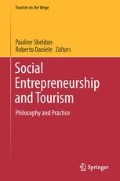Abstract
This chapter concludes the book by considering the role that research and education can play to move the TSE agenda forward. In addition to consolidating the chapter authors’ thoughts about the future of SE and tourism, it also lays out some directions for research tracks in the future. It considers the changes needed in research approaches, in our universities, our curricula, our learners, and ourselves as academics. These changes we hope will stimulate the dialog on how TSE can mobilize the energy, vision and social spirit of those who seek to change the world for the better through tourism.
Access this chapter
Tax calculation will be finalised at checkout
Purchases are for personal use only
References
Alfonso, V.-S. (2010). Destination unknown: The emergence of corporate social responsibility for the sustainable development of tourism. Tourism Management, 31(5), 691–692.
Beckman, S. L. S., & Barry, M. (2007). Innovation as a learning process: Embedding design thinking. California Management Review, 50(1), 25–56.
Bianchi, R. V. (2009). The “critical turn” in tourism studies: A radical critique. Tourism Geographies, 11(4), 484–504.
Bolwell, D., & Weinz, W. (2008). Reducing poverty through tourism (Vol. Working Paper). Geneva: International Labour Office.
Chatterton, P., Hodkinson, S., & Pickerill, J. (2010). Beyond scholar activism: Making strategic interventions inside and outside the neoliberal university. ACME: An International E-Journal for Critical Geographies, 9(2), 245–275.
Chouinard, Y., Ellison, J., & Ridgeway, R. (2011). The sustainable economy. Harvard Business Review, 89(10), 52–62.
Conrady, R., & Buck, M. (2010). Trends and issues in global tourism 2010. New York: Springer.
Donnison, S. (2007). Unpacking the millennials: A cautionary tale for teacher education. Australian Journal of Teacher Education, 32(3), 1–13.
Dredge, D., Airey, D., & Gross, M. J. (2015). Creating the future: Tourism, hospitality and events education in a post-industrial, post-discipniary world. In The routledge handbook of tourism and hospitality education (pp. 533–550). London: Routledge.
Dredge, D., & Schott, C. (2014). The tourism education futures initiative: The way forward. In The tourism education futures initiative: Activating change in tourism education (pp. 371–379). Oxford: Routledge.
Dredge, D., Schott, C., Daniele, R., Caton, K., Edelheim, J., & Munar, A. M. (2015). The tourism education futures initiative. Anatolia, 26(2), 340–346.
Emerson, J. (2003). The blended value proposition: Integrating social and finacial returns. California Management Review, 45(4), 35–51.
Emerson, J. (2006). Moving ahead together: Implications of a blended value framework for the future of social entrepreneurship. In A. Nicholls (Ed.), Social entrepreneurship: New models of sustainable social change (pp. 391–406). Oxford: Oxford University Press.
EU Commission. (2013). Sustainable tourism for development guidebook. Madrid: EU Commission.
Flyvbjerg, B. (2004). Phronetic plannning research: Theoretical and methodological reflections. Planning Theory and Practice, 5(3), 283–306.
Geertz, C. (1990). History and anthropology. New Literary History, 21(2), 321–335.
Hall, C. M. (2007). Pro-poor tourism: Who benefits?—Perspectives on tourism and poverty reduction. Clevedon: Channel View Publications.
Hazelkorn, E. (2009). Impact of global rankings on higher education research and the production of knowledge. Paris: UNESCO.
Heady, L., Rickey, B., & Ogain, E. (2011). School for social entrepreneurs 1997–2011: Impact evaluation report. London: School for Social Entrepreneurs.
Inoue, Y., & Lee, S. (2011). Effects of different dimensions of corporate social responsibility on corporate financial performance in tourism-related industries. Tourism Management, 32(4), 790–804.
Jones, A. L., Warner, B., & Kiser, P. M. (2010). Social entrepreneurship. Planning for Higher Education, 38(4), 44–51.
Law, J. (2004). After method: Mess in social science research. London: Routledge.
Mair, J., & Marti, I. (2013). Social entrepreneurship research: A source of explanation, prediction and delight. Journal of Business Venturing, 28(3), 1–57.
Matten, D., & Moon, J. (2008). Implicit and explicit CSR: A conceptual framework for a comparative understanding of CSR. Academy of Management Review, 33(2), 404–424.
Meyer, J. H. F., & Land, R. (2003). Threshold concepts and troublesome knowledge: Linkages to ways of thinking and practising within the disciplines. Coventry: University of Edinburgh. Retrieved May 20, 2016, from http://www.ee.ucl.ac.uk/~mflanaga/thresholds.html#meyerland
Meyers, N. M., & Nulty, D. D. (2009). How to use (five) curriculum design principles to align authentic learning environments, assessment, students’ approaches to thinking and learning outcomes. Assessment and Evaluation in Higher Education, 34(5), 565–577.
Noddings, N. (1999). Two concepts of caring. Philosophy of Education. Retrieved May 17, 2016, from http://doi.org/ 10.1007/s13398-014-0173-7.2
OECD. (2015). The sustainable development goals: an overview of relevant OECD analysis, tools and approaches. Paris: OECD. Retrieved May 20, 2016, from http://www.oecd.org/dac/post-2015.htm
Owen, C. (2006). Design thinking: Notes on its nature and use. Design Research Quarterly, 1(2), 16–27.
Owen, C. (2007). Design thinking: Notes on its nature + use. Design Research Quarterly, 2(1), 16–27.
Porter, M., & Kramer, M. (2011). Creating shared value. Harvard Business Review, 89(1/2), 62–77.
Radice, H. (2013). How we got here: UK higher education under neoliberalism. ACME: An International E-Journal for Critical Geographies, 12(3), 407–418.
Ren, C., Petersen, M., & Dredge, D. (2015). Guest editorial: Valuing tourism. Valuation Studies, 3(2), 85–96.
Sherman, S. (2011). Teaching the key skills of succesful social entrepreneurs. Stanford Social Innovation Review. Retrieved July 8, 2016 from http://ssir.org/articles/entry/teaching_the_key_skills_of_successful_social_entrepreneurs
Tao, T. C. H., & Wall, G. (2009). Tourism as a sustainable livelihood strategy. Tourism Management, 30(1), 90–98.
Taplin, J., Dredge, D., & Scherrer, P. (2014). Monitoring and evaluating volunteer tourism: A review and analytical framework. Journal of Sustainable Tourism, 22(6), 874–897.
World Economic Forum & Schwab Foundation for Social Entrepreneurship. (2016). Social innovation: A guide to achieving corporate and societal value. Geneva. Retrieved May 20, 2016, from http://www3.weforum.org/docs/WEF_Social_Innovation_Guide.pdf
Yunus, M. (2013, October 15). Why businesses need to reshape society. Huffington Post. Retrieved June 17, 2016 from http://www.huffingtonpost.com/muhammad-yunus/why-businesses-need-to-re_b_4100164.html
Author information
Authors and Affiliations
Corresponding author
Editor information
Editors and Affiliations
Rights and permissions
Copyright information
© 2017 Springer International Publishing AG
About this chapter
Cite this chapter
Sheldon, P.J., Dredge, D., Daniele, R. (2017). Moving Tourism Social Entrepreneurship Forward: Agendas for Research and Education. In: Sheldon, P., Daniele, R. (eds) Social Entrepreneurship and Tourism. Tourism on the Verge. Springer, Cham. https://doi.org/10.1007/978-3-319-46518-0_19
Download citation
DOI: https://doi.org/10.1007/978-3-319-46518-0_19
Published:
Publisher Name: Springer, Cham
Print ISBN: 978-3-319-46516-6
Online ISBN: 978-3-319-46518-0
eBook Packages: Business and ManagementBusiness and Management (R0)

